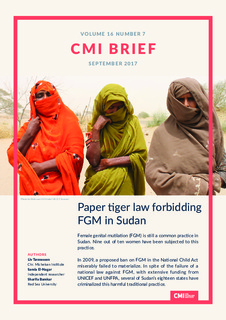| dc.description.abstract | Female genital mutilation (FGM) is still a common practice in Sudan. Nine out of ten women have been subjected to this practice.
In 2009, a proposed ban on FGM in the National Child Act miserably failed to materialize. In spite of the failure of a national law against FGM, with extensive funding from UNICEF and UNFPA, several of Sudan’s eighteen states have criminalized this harmful traditional practice.
This CMI Brief is based on a Sudan Working Paper titled “ Weak law forbidding female genital mutilation in Red Sea State, Sudan ”. The Brief has been published as an article published in open democracy March 2017.
One of these states is Red Sea, located in eastern Sudan. Red Sea is known for being extremely conservative when it comes to women’s rights, and FGM is widely practiced. We chose to investigate the criminalization process in Red Sea out of a genuine desire to study a positive example of a state that had managed to introduce a ban on FGM against all odds. Instead, we found a “paper tiger” law that does not protect girls against FGM. While the law is a political compromise cleverly designed to please stakeholders, girls at risk of undergoing FGM remain unprotected.
Criminalizing FGM in Sudan
FGM includes any procedure involving partial or total removal of the female external genitalia or other injury to the female genital organs for non-medical reasons. It is a harmful traditional practice, which reflects deep-rooted inequality between the sexes and constitutes an extreme form of discrimination against women. Numerous international and regional human rights treaties and conventions condemn the practice.
Eliminating FGM is part of the United Nations sustainable development goal 5 – to achieve gender equality and empower all women and girls. One of this goal’s targets is to “eliminate all harmful practices, such as child, early and forced marriage and female genital mutilation&r | |
